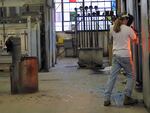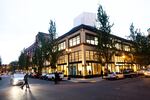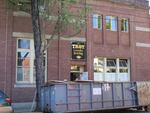2016 was packed — packed! — with big arts stories, both locally and nationally (we're still mourning you, Bowie and Prince, Cohen and Jones, and all the other dynamos). We decided to spend our first episode of 2017 looking back at some of them and updating them for the new year.

Workers at the Uroboros Glass factory before its closure.
April Baer / OPB
Art Glass Meltdown
We should have known 2016 was going to be a doozy last January, when one modest Forest Service research project turned the Northwest's storied art glass industry upside down. Oregon's two major suppliers, Bullseye Glass Co. and Uroboros Glass, stopped most production while everyone tried to figure out what the studies meant. In May, Washington state's Spectrum Glass became the first to announce its closure, and then in September, Uroboros announced it would close its doors after 44 years. A California company called Oceanside GlassTile has announced it will buy both and move their production to Mexico. We review a mid-year feature, and hear from Uroboros founder Eric Lovell, who's in the process of shelving his business.

The Oregon Jewish Museum's new location on NW Davis Street.
Courtesy of The Oregon Jewish Museum
PNCA Closes Museum Of Contemporary Craft, Oregon Jewish Museum And Center For Holocaust Education Buys Its Downtown Space - 12:13
In February, the Pacific Northwest College of Art announced that it would close the Museum of Contemporary Craft. The college was losing more than $200,000 a year keeping it operational, and ultimately concluded that students and faculty simply weren't engaging with it enough to justify the cost. The building has been sold for $5 million, and the collection moved over to PNCA's home at 511 Broadway. We review what happened and the outcry in the craft community.
The in July, the Oregon Jewish Museum and Center for Holocaust Education announced it would buy the downtown space. The museum sees it as an opportunity to step up to a national level with three permanent exhibits and a main rotating gallery that will be curated for the first year by the Portland Art Museum's former chief curator, Bruce Guenther. OJMCHE will open in June with a show by the internationally renowned Russian artist Grisha Bruskin, but you can get a sneak peak on Jan. 18 during an event called "Places of Remembrance," about the incremental laws that made the Holocaust possible.

Artists took what they could and dumped the rest in containers during summer 2016 as the Troy Laundry building was emptied, and prepared for sale.
Aaron Scott / OPB
Where They Landed: Revisiting Displaced Artists From Troy Laundry - 22:35
Affordable workspaces for artists have been dropping like flies: the Towne Storage Building, Conduit Dance, Northwest Dance Project, Polaris Dance Theater, Shaking the Tree, Third Rail Repertory Theatre — every month it seemed like another performing set of studios or arts organization lost its building. Then, at the end of June, word came that the Troy Laundry Building in Southeast Portland had been sold. For nearly 40 years, it housed dozens of artists in what was the city's oldest artists cooperative. We listen back to part of our June story, and seek out some of the artists who were sent searching for new space (hint: it's nigh impossible to fit art supplies and a Christmas tree both in the living room).

Ted Wheeler
John Strieder / OPB
Ted Wheeler Takes Office - 31:09
Portland's new Mayor is Ted Wheeler, former State Treasurer and Multnomah County Commission Chair. The city is waiting to see how he'll handle the economic, social and cultural issues that have wracked Portland with growing pains. We review a few things he told us at last January's Candidates' Forum for Art and Culture. Then we sit down with Jean-Pierre Veillet of the design/build firm Siteworks, architect Tony Belluschi, and urban designer Mike McCullough to talk about some of the planning and bureaucratic challenges that may define Wheeler's term.

Theater and social justice veteran Kevin Jones and actress Chantal DeGroat led a packed audience on a voyage from Jones' childhood in Jamaica, Queens to how Oregon's origins as a white utopia led to today's "Keep Portland Weird."
Aaron Scott / OPB
The Color Of Now, Revisited - 40:28
We finish with one of the biggest stories of 2016: the shooting of black people by police officers and the rise of the Black Lives Matter movement and new groups focused on racial justice. After the heartbreaking week in July when first Alton Sterling was shot in Louisiana, then Philando Castile in Minnesota, and then five police officers in Dallas, we put together a show exploring how local artists were responding to the shootings, from MCs Mic Crenshaw and Rasheed Jamal to the painter Arvey Smith.
We started the show at an event called the Color of Now, where an actor performed a piercing monologue from a touring production called "Hands Up: 7 Playwrights, 7 Testaments" — a collection of monologues about police violence that became one of the defining stage moments of 2016. The event continued with a conversation between Color of Now organizer Chantal DeGroat and "Hands Up" director Kevin Jones, of the August Wilson Red Door Project, and we invited them into the studio to see how their year has gone since, and to ask how the election has affected their continuing work.